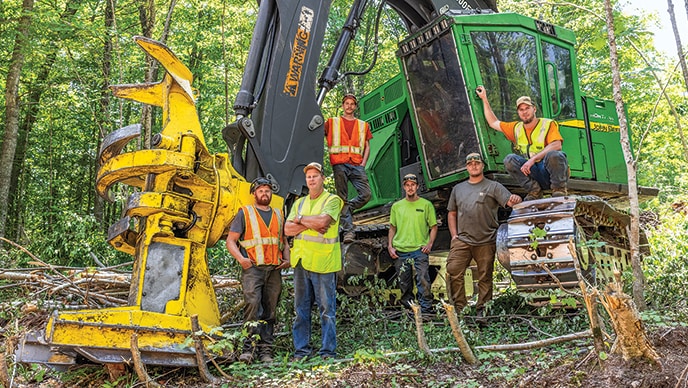
Rows of cut-to-length logs line both sides of a winding path at a Marshall Logging landing site in Antigo, Wisconsin.
Fall 2023
The Marshall Plan
Wisconsin logger Kevin Marshall succeeds by adapting to change and adopting the latest technology
![]() 6 MIN READ
6 MIN READ
Nestled in the picturesque countryside of northern Wisconsin, Antigo has a rich history of logging. In the late 19th and early 20th centuries, Antigo thrived as a logging hub due to its abundant forests, particularly its stands of towering white pine and hardwoods. The city’s name itself comes from the Ojibwe phrase meaning “summer balsam firs by the river.”
Today, logging remains an essential part of Antigo’s heritage and identity. Visitors can explore the city’s rich logging history at the Langlade County Historical Society Museum.
Kevin Marshall, owner of Marshall Logging, knows a thing or two about Antigo’s logging history. His company has been in business for eight decades.
Marshall’s great-grandfather began logging during the 1940s, felling wood with crosscut saws and hauling logs on horse-drawn sleighs or small trucks. By the late 1960s, Marshall’s father obtained one of John Deere’s first skidders, the 440. Much of the hard work of cutting and delimbing was still done with chain saws, but over the next decade the company would add a Deere machine with a stroke delimber, Hahn Harvester Shortwood Processor, and Gafner Iron Mule Forwarder.
Growing up during the 1970s and ’80s, Marshall would tag along with his father in the woods, learning everything he could about logging: “I always paid attention to what he did, watching what he had for equipment and how he logged over the years.”
Marshall began logging full-time after graduating from high school in 1988 before taking over the company from his father in 1998.

“We work in some pretty soft ground. The bogie skidder excels in these conditions.”
Count on Deere when the chips are down
At its peak, Marshall Logging ran three crews and employed 13 people. Then, a large local paper mill closed. “It was devastating to the area,” recalls Marshall. “The mill was accepting approximately 250 truckloads a day to produce a fine graphic paper used for magazines. The market went away and that took a lot out of everybody. We had to find a different way to go.”
Marshall Logging adapted and rebounded. It began chipping for biomass and providing pulp to mills in the area that produced cardboard for the emerging packaging market and other products.
Today, about 60 percent of the wood is chipped; the rest is pulp and some sawlogs. The company’s five-man crew produces nine to twelve loads of chips per day, along with five or six loads of pulpwood. Marshall’s oldest brother Bruce and his son Rick own the trucking operation that hauls the loads to the mills.
Marshall’s brother Todd works on the crew, along with Todd’s son Tim. Another nephew, Joe, who is the son of Marshall’s brother, Mark, also helps out in the woods. During the summer, when he’s not attending college, Marshall’s son Nick runs their John Deere 768L-II Bogie Skidder. His wife, Leah, does all the bookkeeping for the company.
The company picked up the six-wheel 768L-II Bogie Skidder about a year and a half ago and plans on purchasing another. “We work in some pretty soft ground,” says Marshall. “The bogie skidder excels in these conditions. It floats very well and it’s very stable. I’m impressed with how well it gets around on hills. Plus, the larger grapple allows us to haul more wood to the landing with fewer skids.”
The company has been running an 853M Tracked Feller Buncher for about four years. “It has over 6,000 hours on it and we’ve had very little trouble,” says Marshall. “It’s an impressive machine. It’s tough and I love the power of the head. We’ve run rubber-tire feller bunchers in the past. The tracks provide the additional stability and flotation we need for working on hilly ground. And it's very maintenance friendly and easy to service.”
Marshall relies on his local John Deere dealer, McCoy Construction & Forestry, in nearby Merrill to keep his machines up and running. JDLink™ connectivity and the John Deere Operations Center™ keep track of his machines’ locations and idle times to help him ensure they’re running at maximum productivity and efficiency.
Using John Deere Connected Support™, his dealer can warn Marshall of any issue with his machines, often before he knows of the problem. “They can call me and troubleshoot over the phone and, if necessary, remotely diagnose the machine. If needed, they can send a technician with the correct part the first time without charging for an additional service call.”
His son Nick is pursuing a career in exercise science, but Marshall believes his nephews might carry on his logging legacy. Whatever the future has in store, he is optimistic. Loggers always find a way.
“It’s a little bit slow right now, but we’re doing all right,” he says. “The outlook is pretty good. We do a good job and get a lot done when we’re out here. What more can you ask for?”
Marshall Logging Inc. is serviced by McCoy Construction & Forestry, Merrill, Wisconsin.

Warriors of the woods
Marshall Logging of Antigo, Wisconsin, bought its first John Deere in the late 1960s: the iconic 440 Skidder. The machine changed the game when it was released in 1965. Before the 440 came on the scene, wheeled skidders were little more than an engine in a frame. The 440 added operator comfort to the equation, along with improved safety and productivity.
Fast-forward more than a half-century later, and John Deere once again is leading the way with its six-wheel 768L-II Bogie Skidder. Combining excellent tractive ability and flotation with reduced ground pressure, this innovative machine excels in wet conditions and rugged terrain.
During a typical Wisconsin winter, Marshall Logging works on hard, frozen ground, which is easier to log. “Last winter was mild so the ground was soft,” says Owner Kevin Marshall. “The bogie has great flotation and excelled. I don’t believe we could have done that with our four-wheel skidder.”
Related Articles

Front Man
A multigenerational logging company finds success by embracing teamwork and new technology.

Second Wind
The John Deere Powertrain ReLife Plus program extends the life of skidders while helping loggers manage costs.

Growing Tall
A&A Brochu Logging has used vertical integration and economies of scale to gain an edge.
Do you think your company's story would resonate with others in the logging industry?
SHARE YOUR JOURNEY






